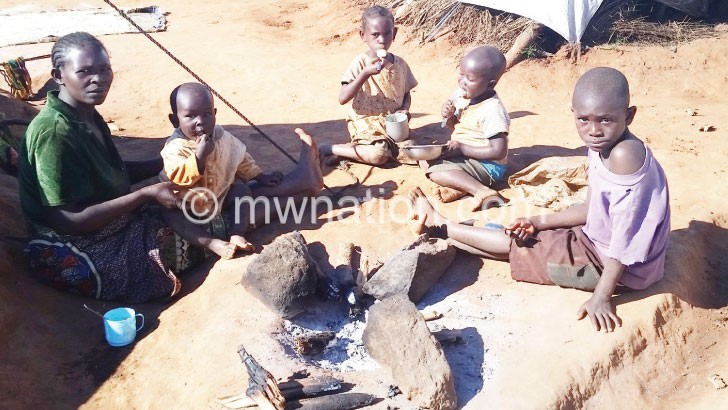Tales from refugee camps
Malawi is a host of close to 25 000 refugees, but how are these welcomed and treated in camps? ALBERT SHARRA was at Kapise Transit Camp in Mwanza and shares the story.
Yankho Malino, 28, of Ndande in Mozambique is a victim of the power wrangle between the governing Mozambique Liberation Front (Frelimo) and the opposition Mozambique National Resistance (Renamo). She was born as her mother, heavily pregnant walked, a week-long journey from Mozambique to Malawi, escaping the country’s conflict between Frelimo and Renamo opposition parties.
The mother went into labour along the way, and gave birth in the bush without any medical assistance.
“I was born near the border between Malawi and Mozambique,” explains Malino adding: “My father was killed during the escape.”

While she is happy that she survived, the pain she is experiencing as a refugee makes her wish she were dead. This is because 20 years after returning to Mozambique, Malino is back at Kapise Refugee Camp in Mwanza.
She reveals: “There is heavy presence of Renamo soldiers in Ndande. Every night, they walk into the villages and abuse people. They ransack houses, rape women and take men with them. We could have escaped at that time, but Frelimo soldiers came to guard the area and told us to stay.
“However, life was tough at night in June. When the two groups started fighting, it affected us. Some people got killed. The other week, they fought non-stop for three days and we decided to escape. I lost my husband during the escape and I don’t know if he is alive.”
Malino, a mother of eight, including twins aged one year, says she walked in the forests for seven days. She says her oldest child, aged 10, is the one who helped her carry one of the twins.
“It’s a three days journey, but with children it was hard. I am happy that we made it to Malawi,” says Malino.
Fatima Nikesi, also from the same area, made it to Malawi, but that was after a close shave with death.
“They abducted me just metres away from my house. I saw a chance to escape, but they saw me and shot towards me. Fortunately, I fell down and the bullet missed me. They never followed me for they thought they had killed me. I was lucky to meet my husband and we escaped to Malawi,” explains Nikesi.
Their two stories are just examples of the trauma the Mozambican asylum seekers at Kapise went through. Most of them escaped without anything except for the clothes they wore.
Officials from United Nations High Commission for Refugees (UNHCR) and International Organisation for Migration (IOM) are at the camp registering every new comer, but the process is slow.
“I have been here for five weeks, but I am yet to be registered. We survive on begging,” complains Orita Sodawo.
Another victim, Juwani Dalini, who stayed in the forests from June to November, says they were welcomed well. Married with eight children, Dalini says they were given a tent, pots, cups, cooking oil, beans, maize and three blankets.
However, from November, they only got maize twice and during the visit to the camp ahead of the relocation of some asylum seekers to Luwani Camp in Neno, Dalini had no food in the house. He could not even remember the last time they had a meal saying they live on porridge made from flour bought at a maize mill with money realised from pieceworks in the nearby villages.
“We received four bags of maize since we came. We need a bag per fortnight and this was finished sometime back. Currently, UNHCR is prioritising newcomers and we are starving,” he explains.
There is no room for privacy. Dalini says he and his eight children—three girls and five boys—slept in one tent until he asked for another one recently. Three blankets for eight, makes them forgo privacy.
They eat beans every day. Most of them cannot even remember when they last washed their clothes with soap as the basic necessity misses on the handouts, provoking poor hygienic conditions, especially in the tents.
“We are struggling with flu here because of dust,” revealed Dalini.
UNCHR senior emergency coordinator Fadela Novak-Irons admitted the situation.
“We have tried to distribute maize, but there was a time when our exercise was halted for a week because the roads were bad. It is true we have never given them soap and clothes, but there have been an exchange of e-mails and we will see what to do,” said Novak-Irons.
UNCHR has also tried to ensure children of school going age are in school by constructing five tents, but during the visit, there had been no lessons for some time because teachers were not coming.
Novak-Irons said the teachers are volunteers, and that UNHCR will discuss with its partners to rework on the problem.
The camp, which houses over 10 000 people, has nine boreholes. However, only five are working according to Village Head Kapise. They also share a few toilets.
Kapise says the influx of the asylum seekers has put pressure on their resources and worsened deforestation.
Novak-Irons says the high population at the camp compromised the quality of their service, hence the need to open another camp at Luwani. She says they will relocate the 10 000 refugees to the camp and ensure there are quality services. So far, 103 have been relocated and joined a group of 82 from Nsanje camp.
“This relocation is a momentous occasion for asylum seekers, who are moving to a place where we can provide better protection and assistance,” says Monique Ekoko, UNHCR country representative. n





